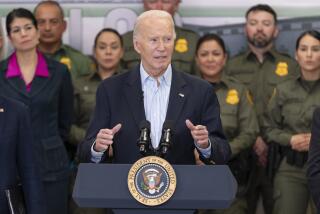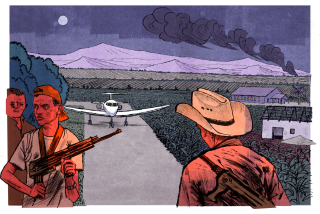New Mexican consul is a survivor of drug wars
As the new Mexican consul in Los Angeles, David Figueroa has a keen appreciation of what’s required to be a public official in his country.
When Figueroa was mayor of the border town of Agua Prieta, Sonora, his father was shot four times on Mother’s Day 2006.
Several months later, after Figueroa became a congressman, he remembers driving from an airport near Mexico City and seeing bright flashes as two dozen gunshots ripped through his car.
He was hit in the leg; another bullet grazed his forehead. “It was horrible,” he said.
On Day of the Dead 2007, a gunman approached Figueroa as he left his hotel in Mexico City. Figueroa ducked as the man pulled a gun from his waistband and fired.
“All I heard was a single bullet casing hitting the pavement,” he said.
The gunman tried to fire again, but his gun jammed. He ran off as Figueroa’s bodyguard fired a round after him.
After almost three years as consul in San Jose, Figueroa — now a 40-year-old father of three — was installed last week as head of Mexico’s largest consulate.
Figueroa, who calls greater Los Angeles “the second-largest Mexican city,” has experience with many of the issues affecting both nations and has been deeply involved in Mexico’s own political transition.
The son of a bracero — a contracted farmworker who picked strawberries in Northern California — Figueroa grew up in Agua Prieta, just over the border from Douglas, Ariz.
He joined the center-right National Action Party (PAN) at a young age and eventually became its local, and then state, president. He was elected mayor, then one of Sonora’s representatives to Congress. In 2006 he coordinated the Sonora campaign of President Felipe Calderon.
While Figueroa was running for mayor, a boy in a working-class neighborhood asked him to attack the robust illegal drug trade that had resulted in the deaths of his mother and many of his neighbors.
Inspired by the boy, Figueroa said he used neighborhood associations and a few police officers he believed he could trust to attack local drug dealers.
“We put behind bars more than 80 dealers in a little more than two years,” he said. “We took down drugs, money and communication equipment. This angered folks involved in that activity. Mothers would come to me and say be careful.”
The attempts on his life that followed are believed to be among the first of numerous attacks on elected officials — many of them fatal — that have taken place during Mexico’s six-year wave of drug violence.
Figueroa comes to a region where Mexican immigrants are more organized than anywhere else in the United States. Dozens of hometown clubs raise money for villages back in Mexico. Many have formed federations of clubs from various Mexican states; some even have centers providing services to immigrants from those states.
Yet this organizational capacity is often focused solely on improving life in villages back home, and at times groups here have been weakened by internal bickering.
Meanwhile, Mexican immigrant communities are beset by low levels of health and education, Figueroa said.
The clubs could be vehicles for changing the ways many immigrants think of education, he said.
“We have to change the culture of packing kids off to school and having the school do it all,” he said. “We have to create the consciousness that the parents have to accompany the child as he’s educated. This is one of our primary challenges as a community. The organizations and the consulate can help.”
More to Read
Start your day right
Sign up for Essential California for news, features and recommendations from the L.A. Times and beyond in your inbox six days a week.
You may occasionally receive promotional content from the Los Angeles Times.






